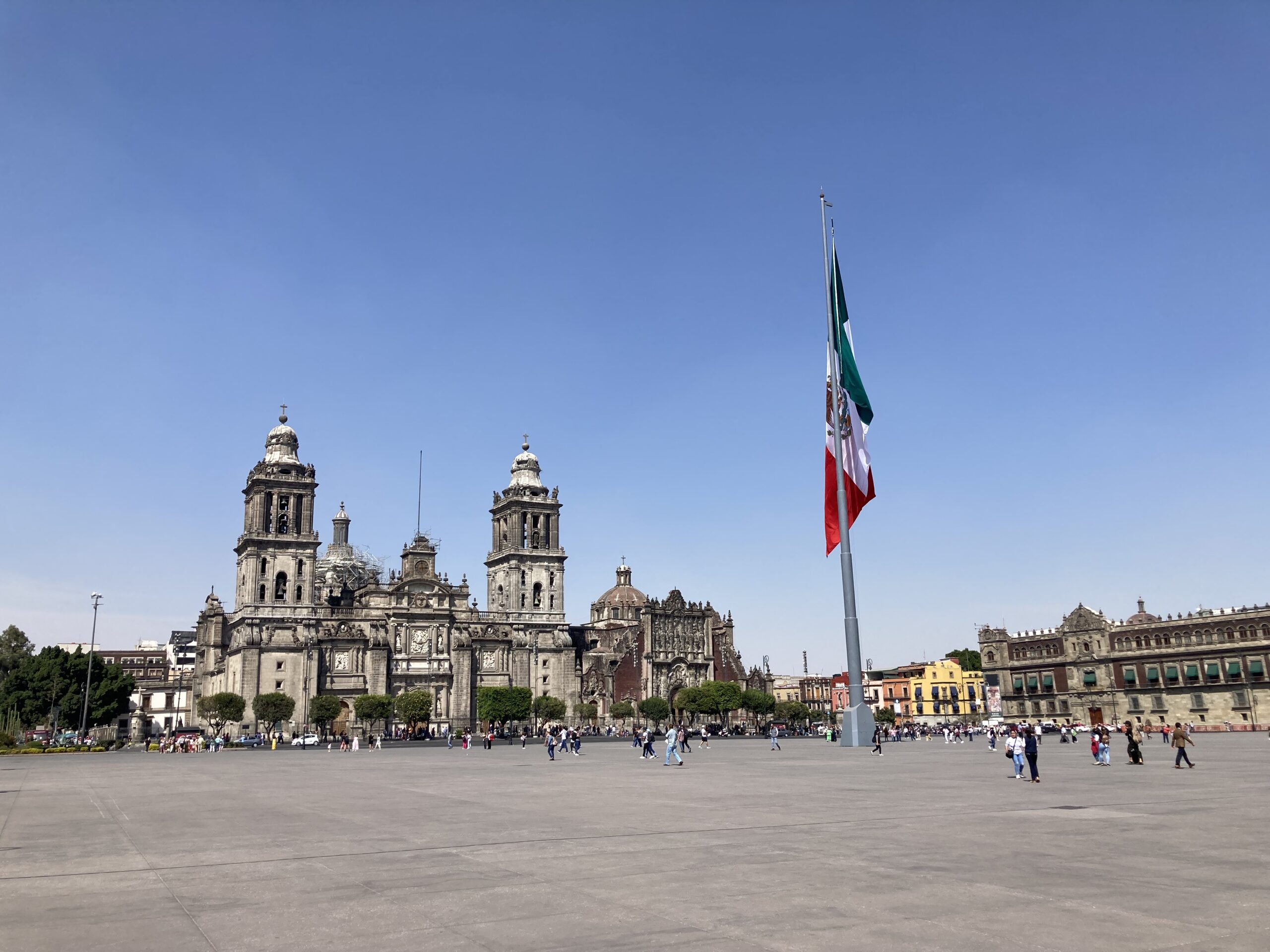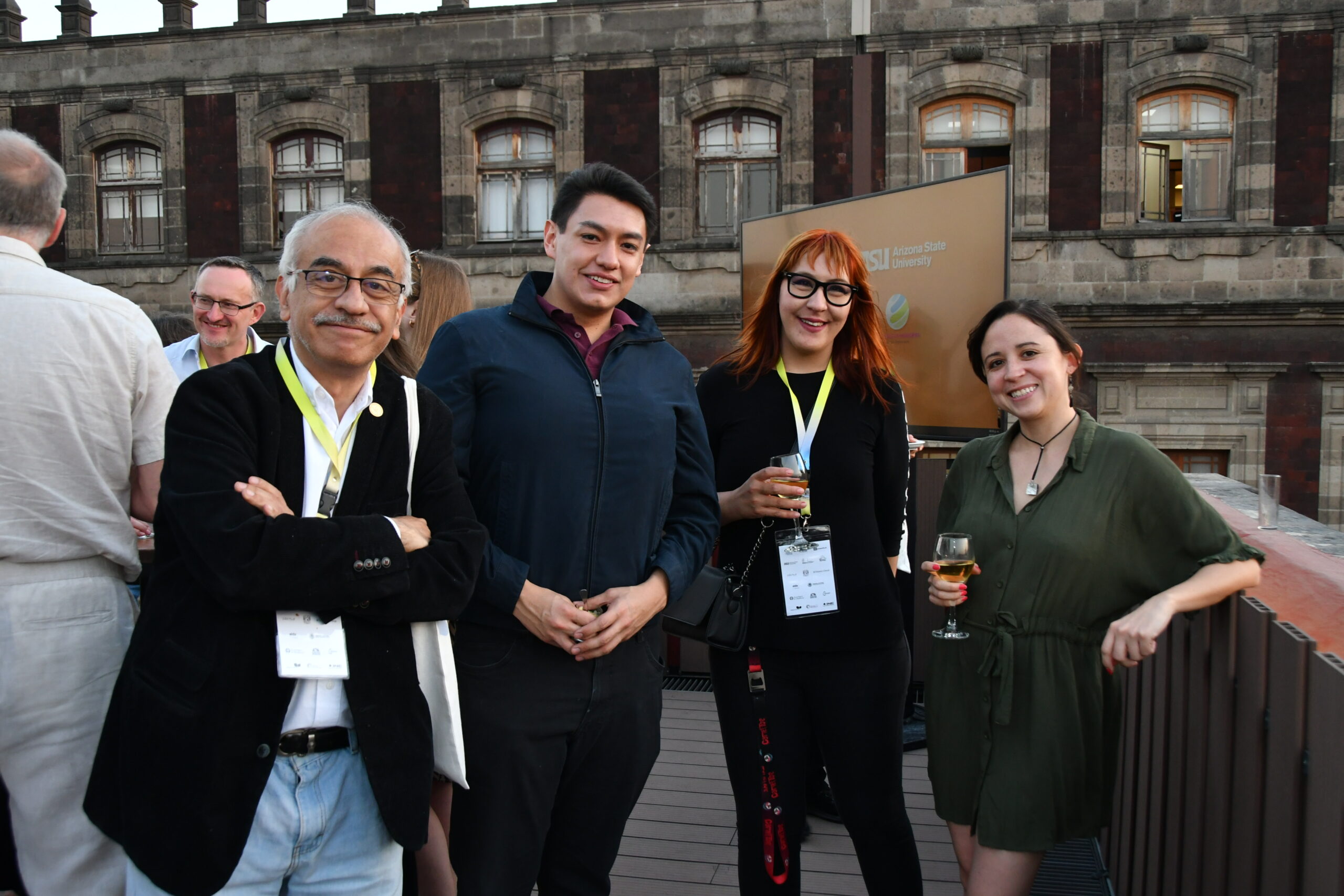
Zócalo Public Square made the pilgrimage to Mexico City's Zócalo to discuss "Are Elected Presidents Bad for Democracy?" as part of the 2023 Global Forum on Modern Direct Democracy. Photograph courtesy of Talib Jabbar
Last week, Zócalo Public Square held our first-ever event just steps from our organization’s namesake and inspiration, Mexico City’s Plaza de la Constitución, otherwise known as the Zócalo, one of the largest public squares in the world.
Together with Democracy International and Metropolitan Autonomous University for the Global Forum on Modern Direct Democracy 2023, Zócalo convened an audience of over 100 at the Casa de la Primera Imprenta de América (House of the First Print Shop in the Americas). We were there in the historic space, just across a narrow road from the National Palace and seat of the president’s office, to ask a question as pressing for Mexico—whose president has recently been accused of attempting to erode his nation’s democratic norms—as it is for the world: “Are Elected Presidents Bad for Democracy?”
The panel included political scientist David Altman, journalist Tess Bacalla, and Democracy International’s European expert Daniela Vancic. During the night, they spoke of the unique challenges facing democracy across the world, citing not only the abuse of power by presidents but also a weakening of civil society organizations and other institutions, such as courts and legislatures.
Former mayor of Los Angeles and Zócalo board member Antonio Villaraigosa gave opening comments, citing the importance of the event’s topic. “Across the world, we’re seeing people get elected to the presidency that don’t believe in democracy,” he said.
Zócalo’s very own Joe Mathews (who is also co-president of the Global Forum) moderated the event, and he opened up the discussion with a history lesson on how the first presidential offices were held not by a national leader, but within the British university system. Mathews then asked the panelists to speak about their observations around the office of the presidency, and why presidents can go wild with power: Is it the person in the job or the job itself?
Vancic considered the position of the presidency in relation to the European Union. While Europe doesn’t have a lot of presidents, there is a European Commission president. But that leader—determined by the Spitzenkandidaten process—is not elected directly. The EU Commission presidents are chosen by political parties. “We tried to bring the system closer to the people and it didn’t work,” Vancic said, citing the failure of direct elections for the European Commission president.
Mathews followed up: Should Europeans even want an EU president?
Yes, Vancic replied, because it would “help the European identity,” which is struggling to build up.
Vancic, who lives in Germany but grew up in Michigan, also spoke about the state of the presidency in the United States. She wouldn’t scrap the presidential system in America, she said, but it needs to be made “more democratic” by getting rid of the Electoral College, for instance, which would make the candidate who won the popular vote the president.
The abuse of presidential power, the panelists agreed, was a major issue for all countries. It’s precisely because of the strength of the presidency in the Philippines that the nation’s state of democracy is dire, Bacalla said. With the return of the Marcos and Duterte families to power last year, the Philippines is now ruled by political dynasties. “It’s as if the People Power Revolution of 1986 didn’t happen at all,” she said, referring to the movement that ousted then-President Ferdinand Marcos, Sr. The succeeding president, Corazon “Cory” Aquino, made sure that the new constitution had good, strong provisions that recognized community organizations in the role of governance. But even so, in successive years, Bacalla says, the Philippine presidency has been used to advance controversial policies, such as President Rodrigo Duterte’s drug war and anti-terrorism bill, which have led to widespread human rights abuses.
Altman, who is a political scientist at the Pontificia Universidad Católica de Chile, spoke about presidential systems in comparison to other systems, like parliamentary ones. “I can mention as many bad presidents as bad prime ministers,” he observed. In Latin America, the presidential systems combined with proportional representation seemed to create abusive regimes, he said. But presidential systems inherently aren’t bad, Altman said, pointing to the value of the constant clash of powers between the executive and other institutions and political units. He even saw hope in the presidency of Donald Trump in the U.S. The country “survived,” he said, meaning the institutions worked. “American democracy was resilient enough to face that.”
As the discussion wrapped up, audience members lined up to ask questions. Bruno Kaufman, co-director of the Global Forum on Direct Democracy, asked about indirect presidencies, which prompted the panelists to speak about the importance of other forms of governance, related to direct democracy.
Vancic cited the need to protect civil society. “There’s a reason autocrats go for civil society first,” she said.
Bacalla cited the importance of debate among citizens. Before fake news, she said, there was healthy political discussion among people. “We’ve lost that,” she said.
Both spoke of the systemic and structural issues with presidential systems, but placed people—citizens, leaders—undoubtedly at the center of these democratic landscapes.





Send A Letter To the Editors